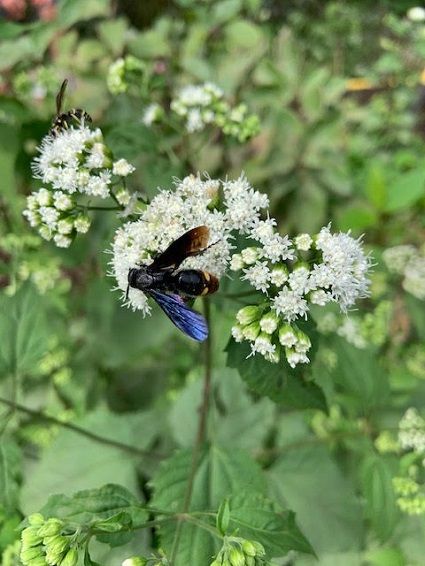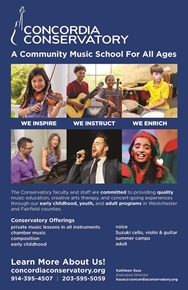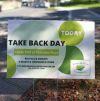Five Steps to a Healthy Yard this Spring

By The Bronxville Green Committee
March 9, 2022: Deep into winter many of us start dreaming of warmer weather and planning our gardens. While our yards are our personal piece of nature, it’s important to remember they are also part of a larger ecosystem. As we strive to make them beautiful, we should also consider how our decisions can help them perform ecological functions – restoring plant, bird, and insect diversity; returning microorganisms and nutrients to the soil; and rebuilding good soil structure so roots can go deep and reduce run-off from rainstorms. Creating gardens that support our local ecology will bring new life to them and make them even more welcoming places to spend time.
Traditional Landscaping vs. Healthy Landscaping
Over the last decades, our desire for pristine yards has led to some yard care practices that we now realize are not good for the local ecology. Traditional landscaping, which consists of lawn and ornamental plants imported from other countries, relies on pesticides, which are dangerous to insects, wildlife and humans. Our wide use of leaf blowers has led to empty planting beds with compacted soil, unprotected roots, and no place for beneficial insects to lay their eggs. Now that we have a better understanding of what is healthy for our landscapes, and our families, we—and our landscapers!—can begin to adopt healthier ways of planting and maintaining our yards.
Healthy landscapes, which are maintained with organic and natural fertilizers, native plants, electric yard care equipment, and mulching services, restores diversity and ecological good health. In the long-term healthy yards require less maintenance and expense while still being beautiful.
Eliminate Pesticides: In Westchester, over 6,000 pounds of pesticides are applied per square mile each year, far more than is used for agriculture. Though pesticides are often promoted as being targeted to a specific insect, and not harmful to other living beings, that is simply not true. Pesticides move through the soil, air and water, producing ill effects wherever they go.
Landscape with Native Plants: It’s common sense: plants that are native to our particular area are best suited to provide food and habitat for wildlife that is also native to our area. As you add native plants (and trees!) to your garden, you’ll discover a new world of gorgeous plants while doing your part to increase plant diversity and reverse the drastic decline of birds and the “insect apocalypse.” Visit Home Grown National Park for more information. You can order online from The Native Plant Center until March 15th.
Remove Invasive Plants: Not native to our area, invasive plants crowd out beneficial plants, reducing diversity and destroying wildlife. They create dense mats of vegetation and climb up trees as vines, strangling trees and imperiling our woodlands. Many invasives, like English ivy, have escaped our traditional gardens. Many are, shockingly, still sold in nurseries. All of them are difficult to eradicate. Removing them—or, at least, controlling their worst effects—is essential to restoring the health of our landscape.
Mow Grass Less: By letting grass grow longer, the roots become stronger and go deeper, making your lawn is less vulnerable to pests and invasive diseases and plants. This Spring ask your landscaper to mow your lawn every other week instead of every week or even skip the month of May to help strengthen your grass for the season.
Use Gas Powered Blowers Less Often: By kicking organic debris, fungus, and animal excrement into the air, leaf blowers increase respiratory diseases in residents and workers. Instead, by letting spring blossoms and other yard debris naturally decompose in your yard, you’ll add nutrients to the soil, improve its structure so roots can grow deep, and reduce the climate-changing pollution associated with gas-powered yard care equipment and transporting debris off-site. When fall comes around, plan to mulch your leaves and place them around planting beds for even more beneficial results!
Join the restoration revolution for a healthy yard!
By making a few changes to your landscaping practices, you can help restore ecological health to our local, shared environment. For more information on these healthy yard tips, visit our website or contact us.
The Bronxville Green Committee is a volunteer organization that is part of the Village of Bronxville. We work to propose and implement environmentally sustainable programs in our community.
Photo courtesy of the Bronxville Green Committee.
Sustainable Living Directory
The Bronxville Green Committee is a volunteer organization under Village government. We work with the Trustees and Village staff on programs that promote clean energy initiatives and sustainable ways of living. Our programs include The Bronxville Giving Garden, a community garden whose produce is donated to local groups; Take Back Day, when we collect items to be recycled; and Pollinator Pathways, which encourages adding native plants to our gardens. We believe everyone can make a difference by adopting simple, sustainable practices in daily life so we can work together to protect what we love -- our families, our homes and our town.
















